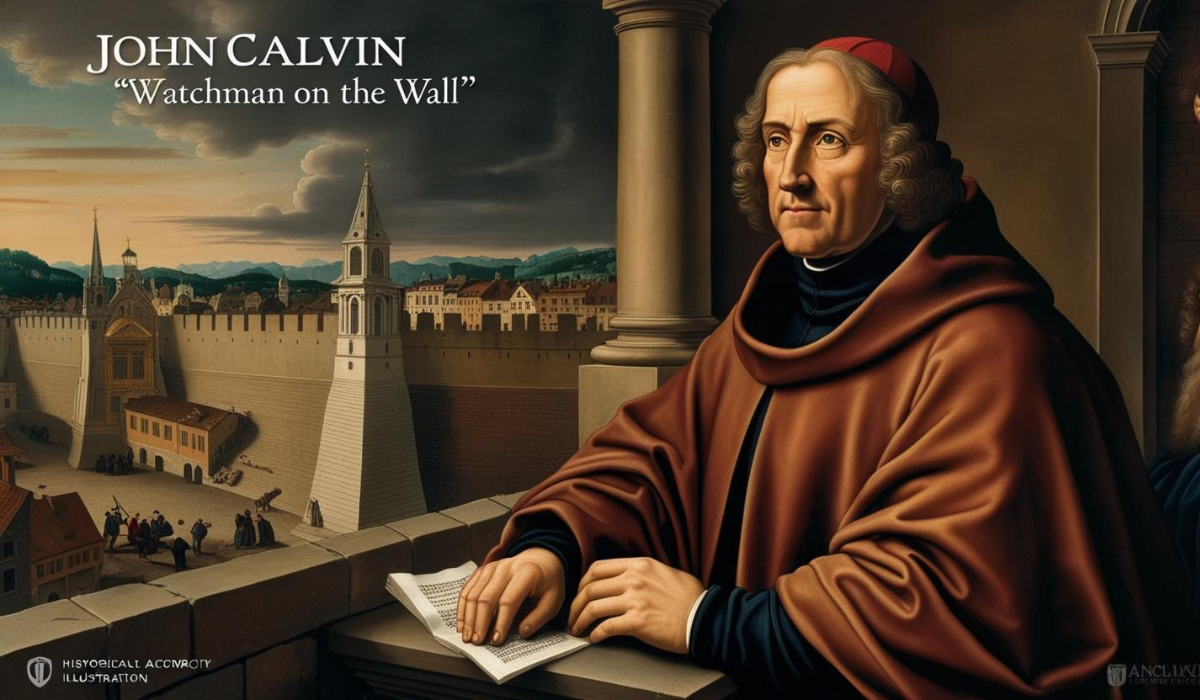Throughout history, the term “WatchMenOnTheAll Calvin” has carried significant weight within religious communities, symbolizing those tasked with safeguarding their people from spiritual and moral peril. Derived from Ezekiel 33:6, the term encapsulates a sacred responsibility: to alert others to danger and preserve the integrity of the faith. John Calvin, a theologian, pastor, and reformer of extraordinary influence, embodied this role with remarkable devotion. Known for his steadfast commitment to sound doctrine and pastoral care, Calvin is a pivotal figure in understanding the duty and legacy of a spiritual watchman.
This blog explores Calvin’s theological contributions, his role as a “watchman,” and the critical lessons modern spiritual leaders can glean from his life and work. Whether you’re a scholar, a spiritual leader, or someone interested in the history of the church, this post unpacks the essence of John Calvin’s legacy and its relevance to today’s world.
Who Were the “WatchMenOnTheAll Calvin”?
The imagery of the “watchman on the wall” originates from biblical times, referencing individuals appointed to stand guard over a city and sound the alarm in the face of approaching danger. The role, though practical in its inception, evolved into a metaphorical duty for spiritual leaders, tasked with preserving their faith communities from doctrinal error, moral corruption, and spiritual complacency.
For WatchMenOnTheAll Calvin, the metaphor of the watchman served as a guiding framework for his theological efforts and pastoral mission. Calvin’s writings consistently reflect his awareness of this calling a mission to protect the church from error and guide believers toward a deeper understanding of God’s truth.
John Calvin’s Role as a Watchman
Safeguarding Doctrine Through Theology
One of Calvin’s most defining roles as a watchman was his theological work, particularly his emphasis on God’s sovereignty. For Calvin, this doctrine was foundational it reassured believers that God was in control, regardless of life’s uncertainties or challenges. Calvin’s theology not only equipped Christians to remain firm in their faith but also served as a safeguard against false teachings that could destabilize their spiritual lives.
Consider Calvin’s seminal work, Institutes of the Christian Religion, widely regarded as a masterpiece of Reformation theology. Within its pages, Calvin systematically addresses Christian doctrine, demystifying complex theological concepts to provide clarity and direction. It’s no coincidence that this work has provided generations with an anchor for sound theology it was carefully crafted as a “watchtower” from which believers could gain perspective and security.
Pastoral Care That Modeled Accountability
Calvin didn’t stop at theology. He understood that being a watchman meant actively caring for his congregation. Calvin dedicated his life to teaching, encouraging, and disciplining those under his spiritual care. It wasn’t uncommon for him to visit the sick, counsel struggling families, or address issues of social justice within his community.
Through his example, Calvin demonstrated that a true watchman doesn’t only instruct from a distance but immerses himself in the lives of those he serves, watching over their spiritual well-being with responsibility and love. For Calvin, being a watchman required the courage to issue warnings when necessary and the compassion to walk alongside those he guided, even in times of difficulty.
Lessons from Calvin’s Role for Contemporary Leaders
WatchMenOnTheAll Calvin’s role as a watchman holds profound lessons for contemporary spiritual leaders navigating the complexities of today’s world. Here are some key takeaways:
- Anchoring Leadership in Scripture
A faithful watchman prioritizes the truth of Scripture, ensuring that their ministry or leadership remains firmly connected to God’s Word. Like Calvin, modern-day leaders must diligently study and apply Scripture to defend against doctrinal drift and guide their communities toward truth.
- Balancing Correction with Care
Addressing errors or challenges within a faith community requires both courage and compassion. Calvin effectively modelled the importance of balancing the role of a protector with the heart of a shepherd, a trait spiritual leaders today should emulate.
- Being Present in the Community
Leadership extends beyond the pulpit. Calvin’s deep involvement in his community reminds us that being present and accessible to those we lead strengthens trust and fosters authentic relationships.
- Standing Firm Amidst Challenges
Calvin’s tenure as a spiritual watchman was not without opposition. From doctrinal disputes to personal attacks, he faced significant resistance but remained focused on his calling. Modern leaders can draw inspiration from Calvin’s unwavering commitment to his mission despite adversity.
FAQs About WatchMenOnTheAll Calvin
Q1: Why is WatchMenOnTheAll Calvin referred to as a “watchman”?
Calvin’s theological work, dedication to his congregation, and emphasis on preserving the church’s purity align with the biblical metaphor of a watchman tasked with protecting the community from danger.
Q2: What was Calvin’s most influential theological contribution?
Calvin’s doctrine of God’s sovereignty remains one of his most influential contributions. It assures believers of God’s control, and fosters trust in divine providence.
Q3: How did WatchMenOnTheAll Calvin balance theology and pastoral care?
While Calvin was a prolific theologian, he remained deeply committed to his pastoral duties. He actively engaged with his church members and addressed their spiritual and practical needs.
Q4: What can modern spiritual leaders learn from WatchMenOnTheAll Calvin?
Today’s Leaders can learn the importance of scriptural grounding, compassionate correction, community involvement, and resilience from WatchMenOnTheAll Calvin’s role as a watchman.
Calvin’s Enduring Legacy
WatchMenOnTheAll Calvin’s life and work continue to resonate as a model of what it means to be a watchman on the wall. His unwavering commitment to Scripture and his compassionate care for his congregation exemplify the qualities of a leader devoted to serving with integrity and faithfulness. For spiritual leaders navigating the complexities of modern times, Calvin’s legacy offers guidance, encouragement, and hope.
To truly embody the role of a watchman, we must, like Calvin, remain vigilant, grounded in truth, and willing to serve with courage and compassion. His example reminds us that faithful leadership is about guarding against danger and building a spiritually vibrant and unified community.

